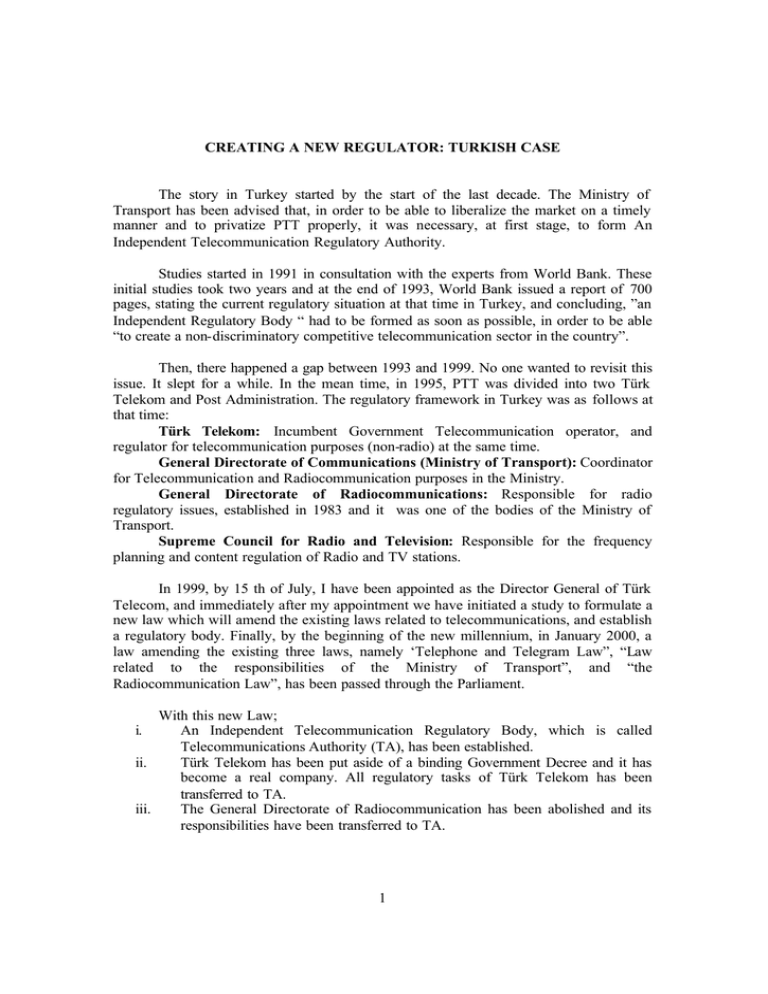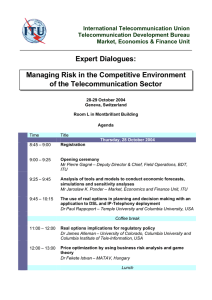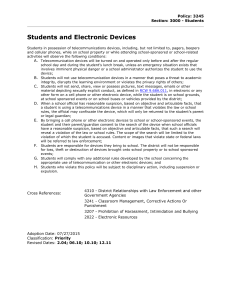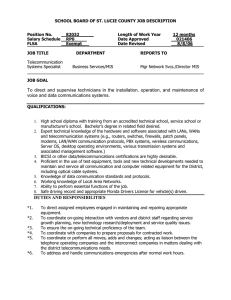The story in Turkey started by the start of the... Transport has been advised that, in order to be able... CREATING A NEW REGULATOR: TURKISH CASE
advertisement

CREATING A NEW REGULATOR: TURKISH CASE The story in Turkey started by the start of the last decade. The Ministry of Transport has been advised that, in order to be able to liberalize the market on a timely manner and to privatize PTT properly, it was necessary, at first stage, to form An Independent Telecommunication Regulatory Authority. Studies started in 1991 in consultation with the experts from World Bank. These initial studies took two years and at the end of 1993, World Bank issued a report of 700 pages, stating the current regulatory situation at that time in Turkey, and concluding, ”an Independent Regulatory Body “ had to be formed as soon as possible, in order to be able “to create a non-discriminatory competitive telecommunication sector in the country”. Then, there happened a gap between 1993 and 1999. No one wanted to revisit this issue. It slept for a while. In the mean time, in 1995, PTT was divided into two Türk Telekom and Post Administration. The regulatory framework in Turkey was as follows at that time: Türk Telekom: Incumbent Government Telecommunication operator, and regulator for telecommunication purposes (non-radio) at the same time. General Directorate of Communications (Ministry of Transport): Coordinator for Telecommunication and Radiocommunication purposes in the Ministry. General Directorate of Radiocommunications: Responsible for radio regulatory issues, established in 1983 and it was one of the bodies of the Ministry of Transport. Supreme Council for Radio and Television: Responsible for the frequency planning and content regulation of Radio and TV stations. In 1999, by 15 th of July, I have been appointed as the Director General of Türk Telecom, and immediately after my appointment we have initiated a study to formulate a new law which will amend the existing laws related to telecommunications, and establish a regulatory body. Finally, by the beginning of the new millennium, in January 2000, a law amending the existing three laws, namely ‘Telephone and Telegram Law”, “Law related to the responsibilities of the Ministry of Transport”, and “the Radiocommunication Law”, has been passed through the Parliament. With this new Law; An Independent Telecommunication Regulatory Body, which is called Telecommunications Authority (TA), has been established. ii. Türk Telekom has been put aside of a binding Government Decree and it has become a real company. All regulatory tasks of Türk Telekom has been transferred to TA. iii. The General Directorate of Radiocommunication has been abolished and its responsibilities have been transferred to TA. i. 1 iv. v. Many of the responsibilities of the Ministry of Transport related to telecommunications have been transferred to TA except for the licencing of the telecommunication operators. The monopoly of Türk Telekom has been lifted except for voice telephony and telecommunications infrastructure. It has been decided to lift the monopoly of Türk Telekom totally by 31.12.2003 and liberalize the market totally. After the adoption of the new law, the regulatory framework of Turkey is as follows: Telecommunications Authority (TA): Completely independent; responsible for whole telecommunication related issues except for licensing of operators. General Directorate of Communications (Ministry of Transport): Coordinator between Ministry and TA with reduced responsibilities. Supreme Council for Radio and Television: No change yet, but there is a proposal submitted to the Parliament to transfer the frequency planning responsibility of this body to TA. The organizational st ructure of the newly established regulatory body is given in annex 1. The headquarters of TA located in the capital city, Ankara. In order to be able to perform our duties properly, we have established 10 Regional Directorates in the major cities and we intend to increase the number gradually to cover all cities, in the future. We have 557 posts in total to be filled, including the five Board Members. This number include the staff for the regional directorates as well. The five member board is the “decision making” body of the Authority. They normally are elected for five years permanent term and appointed by the Council of Ministers. They are totally independent and should be totally impartial. Once appointed, no authority, including Council of Ministers, can take them off, unless they are centenced by the Court because of a dishonest action or they are not able to perform their duties because of a serious illness. Thus, they can be kept outside of political and other influences. The Authority is independent also from the financial stand point. By the new law, TA is given the authority to collect fees from the telecommunication sector for its services to be provided to the sector. In addition, in any case, if the TA needs any financial support from the Government, it is also possible by law. The source of revenues of the Telecommunications Authority are as follows: a) Fees applicable for “import licences” for telecommunications equipment to be imported into the country b) Fees applicable for “manufacturer licences” for telecommunications equipment to be manufactured inside the country c) Fees applicable for type approval of telecommunications equipment 2 d) Fees applicable for conformity testing of telecommunications equipment e) Spectrum usage fees for all radiocommunication equipment including satellite f) Spectrum usage fee, collected from GSM operations on per subscriber per year basis. g) System set-up permission fee from all telecommunication system owners h) 0.05 % of licence fees to be paid by the telecommunication operators to the Government i) Fee to be paid by each operator to the Authority as contribution to the expenditures of the Authority j) Fees collected from the Amateur Radio and Radio Operator examinations conducted by the Authority k) Revenues obtained from any kind of printed material l) Revenues obtained from any kind of consultancy services given by the Authority m) Revenues obtained from seminars, courses and training activities organized by the Authority n) Contributions by the Government from the annual budget o) Financial fines as applicable p) Donations and other revenues The main tasks and responsibilities of the Telecommunications Authority can be summarized as follows: i . to set the administrative, financial and technical regulations ii. to perform follow up func tion for these regulations iii. to issue technical standards, and test the equipment in accordance with these standards iv. to implement administrative and financial measures to those who break the rules and regulations Following gives the details of the duties of the TA: a. to prepare the necessary plans related to telecommunications in general and submit the plans to the Ministry of Transport to be considered by the Government b. to issue import licences, manufacturing approval, conformity approval for the telecommunication equipment c. to conduct radio amateur and radio operator certificate examinations d. to advise the Ministry of Transport on the principles of licencing of operators and to give its view s on the agreements to be signed between the operators and the Ministry e. to follow up the implementation of the agreements are to be met properly by the operators. f. to set reference tariffs to be used for the purpose of interconnection agreements to be signed between the incumbent operator and the other operators for the use of telecommunication infrastructure which is still monopoly until the end of 2003 3 g. to act as a mediator to solve the disputes between operators for the interconnection purpos es h. to prepare reference tariffs for other telecommunication services and to set price caps when necessary i. to approve the price lists set by the operators for their services, as appropriate j. to take encouraging measures for the operators to conduct their operations in a nondiscriminatory competitive environment k. to set performance standards for telecommunications equipment taking into account the international standards l. to set the enforcement regulations and implement them as required m. to set the administrative and financial fines regulations and implement them as appropriate n. to set regulation for the establishment of telecommunication antenna towers in order to keep all transmissions to be made from a unique emission point o. to establish the Nationa l Monitoring System in order to be able to monitor the electromagnetic spectrum properly i. to prepare national frequency allocation plans ii. to prepare national numbering plans iii. to conduct follow up studies for the technical regulations and performance standards; by control and testing the operations iv. to supervise the financial accounting results of telecommunications operators p. to represent Turkey in all international telecommunication fora, including ITU, CEPT, ETSI etc. q. to give authorization to the private sector to become member to the international organizations r. to establish a forum for whole players in the sector in order to lead them in the right direction to cope with the rapid development in Telecommunications I think there are two more issues remained to add to complete the picture. These are related to our short term plans: i. Since one of the most important responsibilities of Regulators is to lead the telecommunication sector, we are planning to establish a “Telecommunication Policy Council” as an informal consultative body. All players, including the Government bodies, industry, universities and consumers, will take part in the Council and the decisions taken by this consultative body will be well respected by TA, and used widely when setting the national regulations. ii. We plan to propose to the Government very soon, to amend the law in order to transfer to TA two remaining issues, namely the licensing of the operators, and the frequency planning for radio and television. In conclusion, I should admit that, it is really a difficult but serious task for the Governments to establish the regulatory authorities. But I believe that regardless from its difficulty, it is “a must” for all countries in order to be able to cope with the rapid developments in this emerging sector. 4



